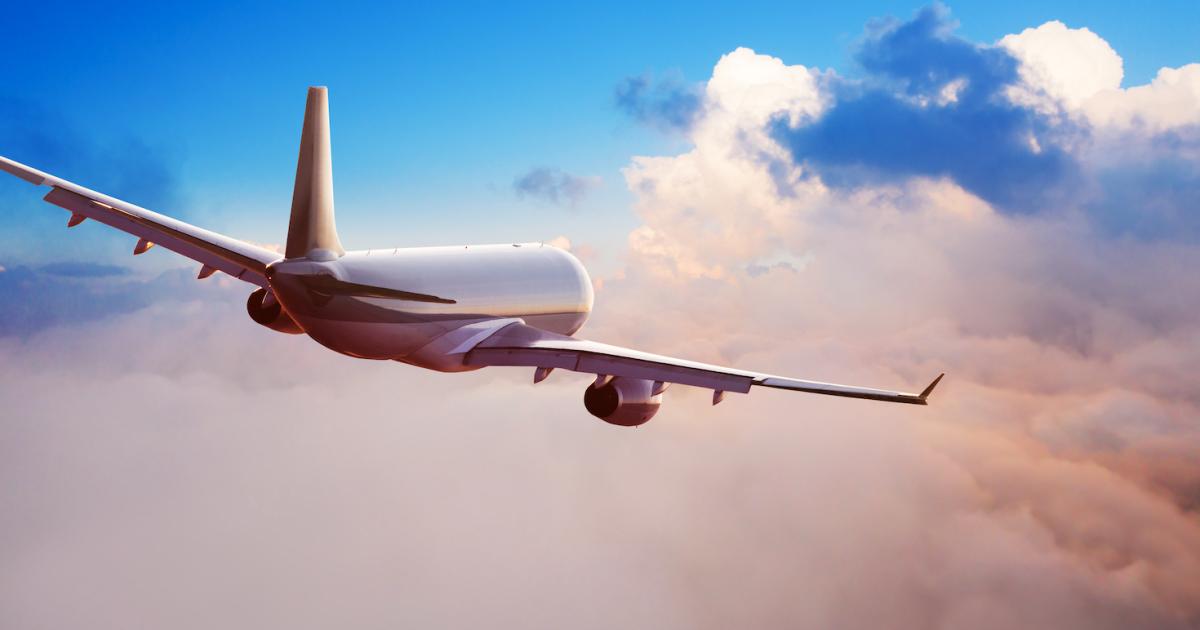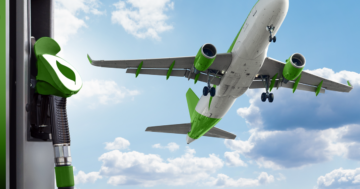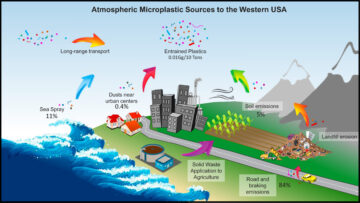
The global warming impact of aircraft contrails could be curbed significantly by harnessing artificial intelligence (AI) and satellite data to help pilots make improved flight path decisions, according to the findings of a major research project released by Google, American Airlines and Breakthrough Energy.
While most particles from an aircraft’s exhaust dissipate fairly quickly in the sky, for a small fraction of global flights sooty contrails are formed and can serve to trap heat in the Earth’s atmosphere, further exacerbating the CO2 impact of the aviation industry.
Contrails are thought to be responsible for about 35 percent of the global warming impact of aviation, according to the Intergovernmental Panel on Climate Change (IPCC).
However, studies have previously claimed it should be possible to avoid creating contrails altogether by lowering the altitude for a small fraction of all global flights by a relatively small amount in order to avoid the most humid parts of the atmosphere where contrails are mostly likely to be created.
“You can’t fly without burning fuel, but you can fly without creating a contrail,” said Erica Brand, senior program manager at Google Research. “Just avoid the super humid regions in the sky.”
Google teamed up with American Airlines and Breakthrough Energy to bring together “huge amounts” of satellite imagery, weather and flight path data and then applied AI-enabled analysis to develop contrail forecast maps.
Using these maps, the firms sought to test whether the data could help 70 American Airlines pilots choose flight routes that could avoid creating contrails, and therefore reduce the global warming impact of aviation.
After the test flights, which took place over six months, Google analyzed satellite imagery which found the pilots were able to reduce the number of contrails by 54 percent, providing “the first proof-point that commercial flights can verifiably avoid contrails and therefore reduce their climate impact.”
The flights that attempted to avoid creating contrails during the tests did burn around 2 percent additional jet fuel as a result of steering away from more humid areas of the sky, the study results show.
However, given only a small number of flights worldwide would potentially need to change course to avoid contrails across the aviation sector, the firms estimated the total fuel impact could be negligible, potentially as low as 0.3 percent across an airline’s flights.
As a result, Google estimated aircraft contrails worldwide could be avoided at scale for a cost of only around $5-$25 per tonne of carbon dioxide equivalent, which it said would make it “a cost effective warming-reduction measure.” It added that “further improvements” to its analysis are expected, which could lower the cost still further.
“Contrail avoidance has the potential to be a cost-effective, scalable solution to reduce the climate impact of flying,” Google Research explained in an update on the study. “We will continue research and development to automate avoidance, target the highest impact contrails and improve satellite-based verification. We’re committed to working across the aviation industry to use AI to make contrail avoidance a reality over the coming years.”
- SEO Powered Content & PR Distribution. Get Amplified Today.
- PlatoData.Network Vertical Generative Ai. Empower Yourself. Access Here.
- PlatoAiStream. Web3 Intelligence. Knowledge Amplified. Access Here.
- PlatoESG. Automotive / EVs, Carbon, CleanTech, Energy, Environment, Solar, Waste Management. Access Here.
- PlatoHealth. Biotech and Clinical Trials Intelligence. Access Here.
- ChartPrime. Elevate your Trading Game with ChartPrime. Access Here.
- BlockOffsets. Modernizing Environmental Offset Ownership. Access Here.
- Source: https://www.greenbiz.com/article/ai-can-help-pilots-minimize-climate-warming-aircraft-contrails-google-study-finds
- :has
- :where
- $UP
- 35 percent
- 70
- a
- Able
- About
- According
- across
- added
- Additional
- AI
- aircraft
- airline
- Airlines
- All
- altogether
- American
- amount
- amounts
- an
- analysis
- analyzed
- and
- applied
- ARE
- areas
- around
- artificial
- artificial intelligence
- Artificial intelligence (AI)
- AS
- At
- Atmosphere
- attempted
- automate
- aviation
- avoid
- avoided
- away
- BE
- brand
- breakthrough
- bring
- burn
- burning
- but
- by
- CAN
- carbon
- carbon dioxide
- change
- Choose
- claimed
- Climate
- Climate change
- co2
- coming
- coming years
- commercial
- committed
- continue
- Cost
- cost-effective
- could
- course
- created
- Creating
- data
- decisions
- develop
- Development
- DID
- during
- earth
- Earth's atmosphere
- Effective
- energy
- Equivalent
- Erica
- estimated
- Ether (ETH)
- expected
- explained
- fairly
- findings
- finds
- firms
- First
- flight
- Flight Routes
- Flights
- flying
- For
- Forecast
- formed
- found
- fraction
- from
- Fuel
- further
- given
- Global
- global warming
- Harnessing
- Have
- help
- highest
- HTTPS
- huge
- humid
- Impact
- improve
- improved
- improvements
- in
- industry
- Intelligence
- IT
- ITS
- jpg
- just
- likely
- Low
- lower
- lowering
- major
- make
- manager
- Maps
- measure
- minimize
- months
- more
- most
- mostly
- Need
- number
- of
- on
- only
- order
- over
- panel
- parts
- path
- per
- percent
- Pilots
- Place
- plato
- Plato Data Intelligence
- PlatoData
- possible
- potential
- potentially
- previously
- Program
- project
- providing
- quickly
- RE
- Reality
- reduce
- regions
- relatively
- released
- research
- research and development
- responsible
- result
- Results
- routes
- s
- Said
- satellite
- satellite imagery
- scalable
- Scale
- sector
- senior
- serve
- should
- show
- significantly
- SIX
- Six months
- sky
- small
- solution
- sought
- steering
- Still
- studies
- Study
- Super
- T
- Target
- teamed
- test
- tests
- that
- The
- their
- then
- therefore
- These
- thought
- to
- together
- took
- Total
- Update
- use
- Verification
- we
- Weather
- were
- whether
- which
- will
- with
- without
- working
- worldwide
- would
- years
- you
- zephyrnet










